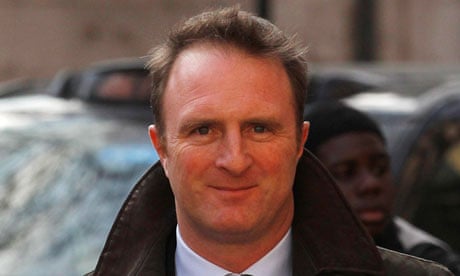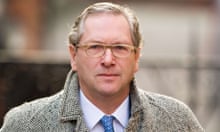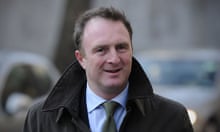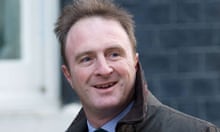James Harding has resigned as Times editor after five years, telling journalists on the paper that he was leaving because News Corporation had made it clear it wanted him to go.
Harding summoned staff to a meeting at 3.30pm on Wednesday to announce that he had resigned. He will leave the paper at the end of the month and it is understood he is unlikely to stay on in another job at Times publisher News International or parent company News Corp.
In his resignation speech in the Times newsroom Harding told shocked colleagues: "It has been made clear to me that News Corporation would like to appoint a new editor of the Times. I have, therefore, agreed to stand down. I called Rupert [Murdoch] this morning to offer my resignation and he accepted it."
Harding added: "This job is a constant privilege and I hope you will, like me, look back with a sense of achievement at the work we have done."
He said he was "proud" of the paper's campaigns on tax avoidance, adoption and cycling and its "unflinching foreign coverage".
He thanked Murdoch for the "great honour" he did him in appointing him editor of the paper and said it was "a privilege and a point of pride" to work there.
Those in the newsroom for the announcement said that Harding was hugged by his emotional deputy editor Keith Blackmore, who will take over as interim editor. In tears, Blackmore said that he was "the best editor the times ever had".
John Witherow, the editor of the Sunday Times for the last 15 years, is being tipped as a possible replacement, along with his deputy Martin Ivens.
The appointment of a new Times editor must be approved by the independent directors of Times Newspapers, the News International subsidiary that publishes it, as part of a legally binding agreement entered into by Murdoch when he acquired the paper in 1981.
Stunned Times journalists took to Twitter to express their shock. Sports journalist Patrick Kidd said he was "immensely saddened" by Harding's "enforced resignation". He was "universally admired, a real positive force".
Reporter Fay Schlesinger tweeted: "James Harding's departure is a massive loss for us. Office quietest I've ever known it."
The timing of the resignation is particularly surprising given that Harding is been leading negotiations between editors and with No 10 in the wake of the Leveson inquiry over how to design a reformed system for press regulation that will operate without statute.
He is understood to have been in close talks with No 10 about how to create a body to certify the work of the press regulator that would be set up by royal charter – and chaired last Wednesday's meeting at the Delaunay restaurant, at which editors broadly agreed to sign up to the non-statutory provisions of the Leveson report.
Rupert Murdoch, chairman and chief executive of News Corp, said: "James has been a distinguished editor for the Times, attracting talented staff to the paper and leading it through difficult times. I have great respect for him as a colleague and friend, and truly hope we can work together again."
Harding said in News International's official statement: "For any journalist, it is an extraordinary privilege and a point of pride to see your work appear beneath the masthead of the Times, the greatest name in newspapers in the world.
"I feel hugely honoured to have been given the opportunity to edit the paper and deeply grateful for the experience of working among the finest journalists in the world. This paper has an unrivalled history and, I am extremely confident, a long and impressive future ahead of it."
Harding was appointed in late 2007 following the promotion of Robert Thomson to run Dow Jones and the Wall Street Journal following Rupert Murdoch's $5bn acquisition of the US financial information and news publisher. He was the second youngest ever editor of the title, aged 38 when he took over.
He came under criticism over the paper's decision to unmask the anonymous police blogger NightJack after his email was hacked by former Times journalist Patrick Foster.
Murdoch told the Leveson inquiry that he was "appalled" that a Times lawyer had misled the high court over how the paper came to reveal Richard Horton's identity and said he was "disappointed" that Harding decided to publish the story in the first place.
Harding began his career on the Financial Times. He opened the paper's Shanghai bureau and went on to become bureau chief in Washington before joining the Times as business editor.
In an email to staff, outgoing News International chief executive Tom Mockridge praised Harding's "energy, wit and inspiration" and the Times' coverage of key events including Olympic Games.
He added: "Since his appointment as editor in 2007, James has guided the Times through transformational change. Under his leadership the title has embraced the huge advancements in technology, whilst remaining true to the heart of the story and its world-renowned reputation as the paper of record.
"In the face of industry-wide pressures on circulation, the Times has managed to steady its market share and expand its subscription model."
To contact the MediaGuardian news desk email editor@mediatheguardian.com or phone 020 3353 3857. For all other inquiries please call the main Guardian switchboard on 020 3353 2000. If you are writing a comment for publication, please mark clearly "for publication".




